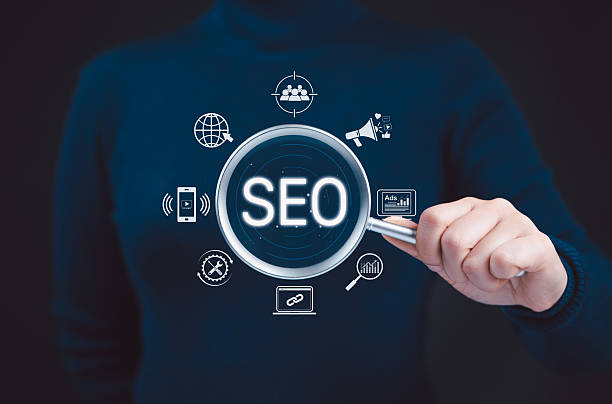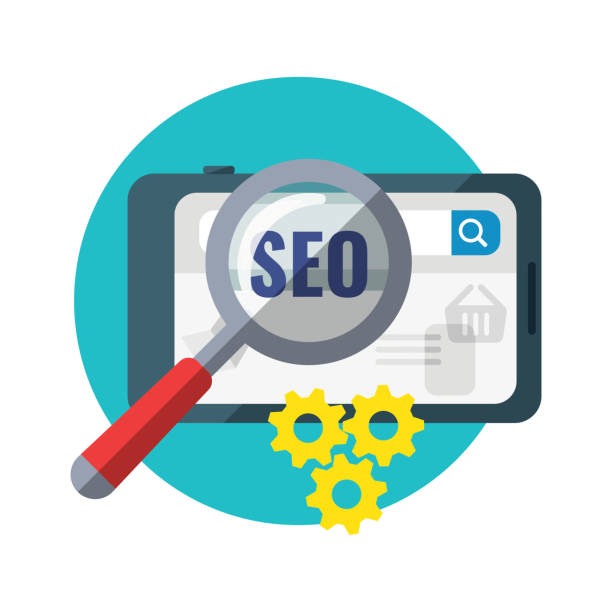Introduction to SEO and its Importance
![]()
In today’s digital world, visibility is crucial for the success of any online business.
This is where the concept of SEO or Search Engine Optimization comes in.
SEO is a set of techniques and strategies aimed at improving a website’s ranking in the organic results of search engines like Google, Bing, and Yandex.
In fact, #SEO is more than just keywords; it means a deep understanding of how search engines work and what users need.
When a user searches for specific information, search engines try to display the most relevant and authoritative results.
Websites that correctly adhere to SEO principles have a greater chance of appearing on the first pages of results and attracting organic (free) traffic.
This traffic is often of higher quality, as users are actively searching for your products or services.
This educational approach helps you understand the basics of SEO.
The importance of SEO is not limited to achieving higher rankings; it also leads to increased brand credibility, improved user experience, and ultimately, increased sales and revenue.
Without SEO, even the best content and products might remain hidden among the vast amount of information on the web.
SEO, as a continuous and dynamic process, requires constant updates and adaptation to changes in search engine algorithms.
A deep understanding of user behavior and their search intent plays a key role in the success of SEO strategies.
Optimization is not just for search engines, but for the users who utilize them.
This dual approach forms the core of any successful SEO strategy.
Tired of losing customers due to poor e-commerce website design? With Rasaweb, solve this problem forever!
✅ Increase sales and conversion rate of visitors to customers
✅ Smooth and engaging user experience for your customers⚡ Get free consultation
How Search Engines Work and the Role of SEO

To fully understand the role of SEO, we must first understand how search engines work.
Search engines go through three main stages to deliver results to users: Crawling, Indexing, and Ranking.
In the crawling phase, search engine bots, also known as crawlers or spiders, visit websites and follow links to find new or updated pages.
This process is similar to browsing the internet and gathering information.
After crawling, the collected information is stored in a vast database called an Index.
This index includes all identified web pages and their related information, such as keywords, content, and page structure.
At this stage, the search engine analyzes the page content and understands what it is about.
The final and perhaps most important stage is ranking.
When a user enters a search query, the search engine quickly scans its index to find the most relevant and high-quality pages.
Then, using its complex algorithms (which consider over 200 different factors), it ranks these pages based on their relevance and authority.
This is precisely where SEO plays its role: by optimizing your website for these three stages, you help search engines find your content more easily, understand it, and ultimately give it a better ranking.
This explanatory approach is the foundation of any SEO strategy, and without understanding these mechanisms, your SEO efforts might be fruitless.
Understanding how crawling, indexing, and ranking work is the cornerstone of any successful Search Engine Optimization campaign.
On-Page SEO Techniques

On-Page SEO refers to all optimizations performed within your website, over which you have complete control.
These techniques include optimizing content and HTML elements of the page to improve ranking in search engines and increase relevance to user queries.
One of the most important aspects of On-Page SEO is keyword optimization.
This means strategically using relevant keywords in the page title (Title Tag), meta description (Meta Description), headings (H1, H2, H3), and the main body of the content.
However, excessive use of keywords (keyword stuffing) is not only discouraged but can also harm your ranking.
Content quality also plays a vital role.
Your content should be specialized, useful, unique, and engaging to satisfy both users and search engines.
Visual elements such as images and videos should also be optimized; for images, using a descriptive file name, appropriate Alt Text, and image compression are essential.
Friendly URL structure, using relevant internal links (Internal Linking) that help search engines crawl and understand website content, and page loading speed are other important factors in On-Page SEO.
User Experience (UX) has also become increasingly important in On-Page SEO, as search engines aim to provide the best experience for their users.
This comprehensive guide on On-Page SEO can help you improve your site’s performance.
The table below shows some important On-Page SEO elements:
| On-Page SEO Element | Description and Importance | Optimization Tip |
|---|---|---|
| Title Tag | The first thing seen in search results and tells search engines what the page is about. | Short, includes main keyword, and engaging (approx. 50-60 characters). |
| Meta Description | A brief description of the page content in search results. | Engaging and compelling for clicks (approx. 150-160 characters), includes keyword. |
| URL Structure | Web page address. | Short, descriptive, includes keyword, and human-readable. |
| Headings (H1-H6) | Define content structure and tell search engines about main topics. | H1 only once per page, includes main keyword; logical use of other headings. |
| Internal Links | Links from one page to another within the same website. | Help improve crawling, page authority distribution, and user experience. |
Off-Page SEO Strategies

While On-Page SEO focuses on optimizing elements within your website, Off-Page SEO deals with factors outside your website that influence its ranking in search results.
The most important and well-known factor in Off-Page SEO is Backlinks.
Backlinks are links from other websites to your website and are considered by search engines as a vote of confidence for your content.
The greater the number and quality of backlinks, the more your website’s Domain Authority increases, and consequently, its ranking improves.
But the important point is link quality, not just quantity.
Links from reputable, relevant, and high-authority websites are far more valuable than dozens of links from unreliable websites.
One of the main strategies for acquiring backlinks is to create high-quality, valuable content that is naturally linked to by others.
This includes creating thought-provoking content, infographics, case studies, and free tools.
Activity on social media, although not directly a ranking factor in SEO, can help increase visibility and traffic to your website and indirectly create opportunities for acquiring links.
Participating in relevant forums and communities, guest blogging on other websites, and receiving positive user reviews are also other Off-Page SEO strategies.
These factors show search engines that your website is a reputable and reliable source.
Correct implementation of Off-Page SEO strategies requires time and effort, but its results can have a tremendous impact on your website’s SEO ranking.
This is a practical guide to understanding how to build your site’s authority from external sources.
Did you know your company’s website is the first point of contact for 75% of potential customers?
Your website is the face of your brand. With **Rasawweb**’s corporate website design services, build an online presence that earns customer trust.
✅ Create a professional and lasting image for your brand
✅ Attract target customers and increase online credibility
⚡ Get free consultation from **Rasawweb** experts!
Keyword Research for SEO

Keyword research is one of the most fundamental steps in any SEO strategy.
This process involves finding the words that your target audience types into search engines to find the information, products, or services they need.
The goal of keyword research is to identify phrases that not only have a good search volume but are also relevant to your business and have reasonable competitiveness.
Various tools such as Google Keyword Planner, Ahrefs, Semrush, and Ubersuggest are available for this purpose, helping you discover relevant keywords and analyze their search volume, difficulty, and competition.
One important approach in keyword research is to focus on Long-Tail Keywords.
These are longer, more specific search phrases (usually three words or more) that, although they have lower search volume, often indicate a more specific search intent and have higher conversion rates.
For example, instead of “shoes”, you might target “Nike men’s sports shoes size 42”.
These types of keywords are less competitive and easier to rank for.
Also, in the keyword research process, analyzing competitors’ keywords and understanding how they rank can be very beneficial.
This is an analytical approach that helps you shape your content strategy based on real user needs and market opportunities.
The ultimate goal of keyword research is to create a roadmap for your site’s content that ensures you are attracting relevant and high-quality traffic.
Technical SEO Aspects

Technical SEO refers to optimizing the infrastructural aspects of your website so that search engines can more easily crawl, index, and rank it.
This part of SEO is often more hidden but has a significant impact on the overall site performance.
One of the most important aspects of technical SEO is Page Speed.
Both users and search engines value speed; slow websites can lead to high bounce rates and poor user experience, which negatively affects SEO ranking.
Tools like Google PageSpeed Insights can help you identify problems and provide solutions.
Another crucial factor is Responsive Design and mobile compatibility.
Given the increasing use of mobile devices for searching, Google prioritizes websites that are optimized for mobile (Mobile-First Indexing).
The website structure should also be optimized; a hierarchical and logical structure helps search engines understand the relationship between different pages.
Using HTTPS protocol (site security), XML Sitemap which helps search engines crawl all important pages, and Robots.txt file which tells crawlers which sections not to crawl, are other key aspects of technical SEO.
Fixing Crawl Errors and managing Redirects are also very important to prevent loss of page authority.
This part of SEO is entirely specialized and requires specific technical knowledge to ensure your website is technically accessible and optimized for search engines.
Content Creation and SEO

Content is king, and in the world of SEO, this statement holds true more than ever.
Producing high-quality and valuable content not only helps attract users but also rewards search engines.
Your content should be relevant, informative, trustworthy, and unique.
There are various types of content that can be beneficial for SEO, including blog articles, product pages, service pages, infographics, videos, and podcasts.
Each type of content requires its own specific optimization approach.
For example, for blog articles, focusing on target keywords, using appropriate headings, optimized images, and relevant internal and external links is crucial.
Entertaining content can also play an important role in audience engagement and increasing social sharing, which indirectly impacts SEO.
Besides quality, Content Freshness is also important in SEO.
Regularly updating old content and adding new content shows search engines that your website is active and dynamic.
Also, considering User Intent when creating content is crucial.
Is the user looking for information (Informational Intent), wanting to perform an action (Transactional Intent), or looking for a specific website (Navigational Intent)?
Creating content that precisely addresses these needs has a higher chance of ranking.
This informative approach highlights the continuous importance of content creation and optimization in SEO strategy.
The table below shows optimized content types for SEO:
| Content Type | SEO Goal | Key Optimization Tip |
|---|---|---|
| Blog Articles | Answering questions, attracting organic traffic, building authority. | Keyword research, engaging headings, deep and practical content. |
| Product/Service Pages | Sales, attracting customers with high purchase intent. | Detailed descriptions, transactional keywords, high-quality images, customer reviews. |
| Infographic | Sharing complex information visually, acquiring backlinks. | Engaging design, accurate information, easy sharing options. |
| Video | Increasing user dwell time, attracting visual audiences. | Optimizing title and description, using subtitles, uploading to appropriate platforms. |
| Case Studies | Proving expertise and credibility, lead generation. | Focus on results, figures, logical structure. |
Measuring SEO Success and Analytical Tools

After implementing SEO strategies, it is important to be able to measure and analyze their impact.
Measuring SEO success helps you identify the strengths and weaknesses of your strategy and make data-driven decisions to improve performance.
Various analytical tools are available for this purpose, among the most important of which are Google Analytics and Google Search Console.
Google Analytics provides valuable data about your website traffic, including the number of visitors, most visited pages, user dwell time, bounce rate, and traffic sources.
This information helps you understand user behavior and implement necessary improvements on your website.
Google Search Console is a vital tool for monitoring your website’s performance in Google search results.
This tool shows you what keywords your website appears for, how many clicks it receives, identifies crawl errors, and reports indexing issues.
This provides a deep analytical approach to SEO.
In addition to these tools, paid SEO tools like Ahrefs, Semrush, and Moz offer advanced capabilities for keyword analysis, backlink checking, competitor analysis, and keyword rank tracking.
By regularly using these tools, you can identify important trends, discover new opportunities, and ensure your SEO efforts are on the right track.
This continuous process of measurement and improvement is an integral part of any successful SEO campaign, and without it, website optimization would be merely guesswork.
Disappointed with your e-commerce site’s low conversion rate? Rasawweb transforms your e-commerce site into a powerful tool for attracting and converting customers!
✅ Significant increase in visitor-to-buyer conversion rate
✅ Unparalleled user experience to boost customer satisfaction and loyalty⚡ Get free consultation from Rasawweb!
Common SEO Mistakes to Avoid

On the path to search engine optimization, mistakes can occur that negatively impact your website’s ranking.
Identifying and avoiding these common SEO mistakes is essential for long-term success.
One of the biggest mistakes is Keyword Stuffing.
Attempting to insert too many keywords into content not only reduces readability but is also identified as a spam tactic by search engines and can lead to penalties.
Instead, focus on producing natural, high-quality content where keywords are used logically.
Another mistake is ignoring technical SEO.
If your website is not optimized for speed, crawlability, and mobile compatibility, even the best content will struggle to rank.
Failure to update content and SEO strategies is also a common mistake.
The world of SEO is constantly changing, and search engine algorithms are regularly updated.
Failure to keep up with these changes can lead to a loss of your ranking.
Also, ignoring User Experience (UX) because it’s “not related to SEO” is a big mistake.
Search engines are increasingly focusing on user satisfaction, and websites with poor user experience will ultimately suffer in terms of SEO.
This is an important lesson that helps you avoid common SEO pitfalls.
Not pursuing quality backlinks and focusing only on their quantity is another common mistake.
The main guidance is to always focus on quality, relevance, and value for the end-user.
Local SEO and its Importance

For businesses that serve customers in a specific geographical area, Local SEO is of high importance.
Local SEO focuses on optimizing your online presence to attract customers who are physically near you and are looking for your products or services.
This type of SEO is especially vital for retail stores, restaurants, clinics, and other location-based businesses.
One of the most important tools in Local SEO is the Google My Business (GMB) profile.
By meticulously optimizing this profile, including accurate business information (Name, Address, Phone – NAP), operating hours, high-quality images, and responding to customer reviews, you can significantly increase your chances of appearing in Google’s local results and maps.
In addition to GMB, receiving positive online reviews from customers is also very important in Local SEO, as search engines use reviews as a signal of credibility and popularity.
Ensuring the consistency of your NAP information across all online directories (such as Yelp, Foursquare, etc.) is also crucial.
This consistency helps search engines verify the accuracy of your business information.
Creating relevant local content, such as blog articles about local events or news related to your area, can also help attract local traffic.
This is a specialized approach for businesses that want to have a strong presence in their local market.
Local SEO allows you to be available to customers at the moment they are ready to buy, and this directly impacts your conversion rate and sales.
The importance of local SEO is growing for small and medium-sized businesses.
Frequently Asked Questions
| Question | Answer |
|---|---|
| What is SEO? | SEO, or Search Engine Optimization, is the process of increasing the quality and quantity of website traffic by improving the site’s ranking in natural (organic) search engine results like Google. |
| What are the main types of SEO? | SEO is divided into three main categories: On-Page SEO, Off-Page SEO, and Technical SEO. |
| What does On-Page SEO include? | On-Page SEO includes optimizing elements within the website, such as keywords, title tags, meta descriptions, content, URL structure, images, and internal links. |
| What is Off-Page SEO? | Off-Page SEO refers to activities outside the website that help improve its ranking, such as backlink building, social media marketing, and brand mentions. |
| What is Technical SEO? | Technical SEO focuses on optimizing the technical aspects of a website to help it be better crawled and indexed by search engines. This includes site speed, mobile-friendliness, site structure, Sitemaps, and the Robots.txt file. |
| What role do Keywords play in SEO? | Keywords are phrases that users enter into search engines. Correct and targeted use of relevant keywords in content and site elements helps search engines understand the topic of your page and display it for relevant searches. |
| What is a Backlink and why is it important? | A backlink, or inbound link, is a link from one website to another. Backlinks act as a “vote of confidence” from other sites for search engines and play a significant role in a site’s authority and ranking, especially if they come from reputable sites. |
| What impact does quality content have on SEO? | Quality, relevant, comprehensive, and unique content not only attracts and retains users but also signals to search engines that your page is valuable. This helps improve rankings, reduce bounce rates, and increase user time on site. |
| Why is site loading speed important for SEO? | Site loading speed is an important ranking factor for Google. Faster sites offer a better user experience, have lower bounce rates, and are preferred by search engines. |
| Is SEO a one-time process? | No, SEO is an ongoing and long-term process. Search engine algorithms are constantly changing, competition is increasing, and site content also needs updating. Therefore, SEO requires continuous monitoring, analysis, and optimization. |
And other services of Rasaweb Advertising Agency in the field of advertising
Smart Digital Advertising: An innovative platform for improving website traffic with intelligent data analysis.
Smart Marketing Automation: A new service for increasing customer acquisition through SEO-driven content strategy.
Smart Data Analysis: A quick and efficient solution for increasing click-through rates with a focus on marketing automation.
Smart Google Ads: Designed for businesses looking to increase sales through attractive UI design.
Smart Advertising Campaign: Professional optimization for increasing website traffic using custom programming.
And over hundreds of other services in the field of online advertising, advertising consultation, and organizational solutions
Online Advertising | Advertising Strategy | Advertorial
Resources
SEO Training on SEORoozWhat is SEO on DMBoardUnderstanding Google Algorithms on NegaranDLWhat is Google Algorithm on RankOne
? To reach the peak of success in the digital world, Rasaweb Afarin is by your side with professional responsive website design and digital marketing services.
📍 Tehran, Mirdamad Street, next to Central Bank, Southern Kazeroun Alley, Ramin Alley, No. 6


